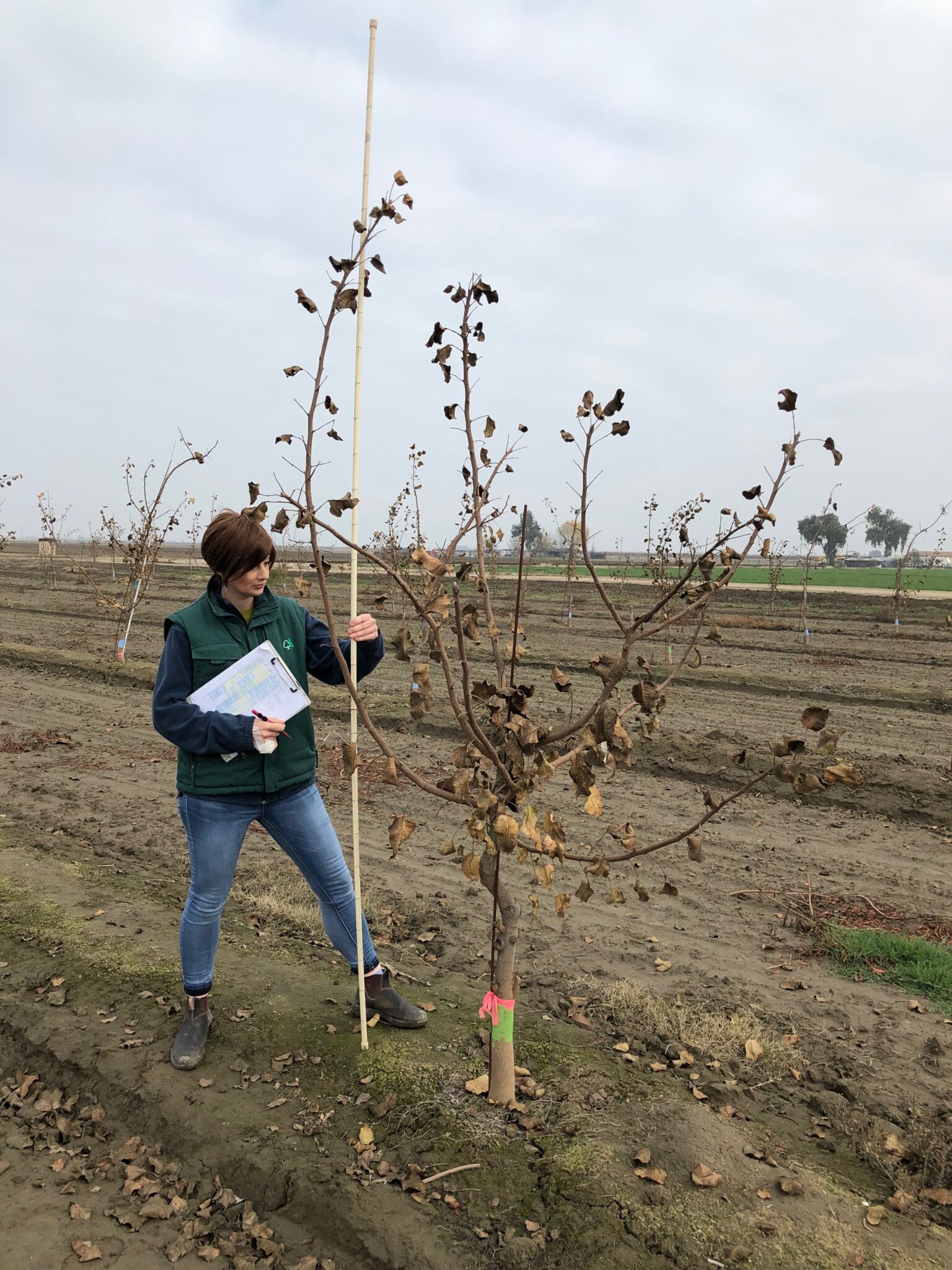
An avid member of 4H club when she was a kid, UCCE farm advisor Elizabeth Fichtner was exposed early to the elements of agriculture and extension. She also had the unique experience of observing how urbanization can affect agricultural lands. Originally from Long Island, N.Y., Fichtner watched an area that was rural in her father’s generation— and still relatively rural early in her own— transform into the densely populated area that it is today.
Seeing that transition sparked an interest that led her to Cornell University, where she earned her undergraduate degree in horticulture. After working summers at University of Wisconsin, Madison, Fichtner developed an interest in soilborne plant pathogens and decided to continue her education at North Carolina State University, Raleigh. She completed her M.S. and Ph.D. at North Carolina State University with dual majors in plant pathology and soil science.
Research and Career Opportunities
While in North Carolina, Fichtner had the opportunity to conduct interdisciplinary research that focused on investigating soil properties that are suppressive to plant disease. At the time, North Carolina was dedicated to finding alternate crops to replace tobacco acreage, while grappling with the waste from hog farming. Fichtner’s research, in part, focused on manipulating swine waste to suppress soilborne pathogens.
After completing her Ph.D., Fichtner made the cross-country move to California as a post-doctoral researcher in forest pathology at UC Davis. It was there that her experience working with phytophthora, a common pathogen of tobacco, was easily applied to researching sudden oak death, a disease that had emerged in both California and Europe within the last 20 years.
During her post-doctoral work, Fichtner collaborated with several farm advisors within UC ANR and developed an interest in an extension career. When a farm advisor position opened up in Tulare County, she was eager to apply.
“It was just really intriguing to me, because I had been working in forestry, and [the new position] was in trees,” says Fichtner of how she ultimately landed in California’s vast growing region. “It just kind of felt like a natural fit.”
It’s been 11 years since that decision shaped Fichtner’s career as a farm advisor. While there have been some big changes during the nearly two decades in total that she’s been with UCCE, Fichtner notes one in particular.
“Because I worked in tree nuts, I’ve seen tremendous growth,” says Fichtner. “Absolutely tremendous growth.”
The nut crop acreage in Tulare County is almost three times higher than it was in 2009, with increases in pistachio and almond acreage accounting for the most dramatic increase in the county’s nut crops.
In addition to tree nuts, Fichtner also works with olives. When she first began with extension, her workload consisted of more olives than pistachios. These days, there is a huge decline in table olives, with a vast majority of that acreage going into citrus and pistachios. Crop value and rising labor costs for hand-harvesting of olives are the most likely reasons for the decline of olive acreage, she said.
Fichtner’s work in tree nuts and other crops have opened up access to a lot of different grower communities, boards, grant opportunities, grower incentives and more, but she also sees how streamlining and a movement toward more collaboration among the organizations could help to further support growers.
“So many growers are growing multiple kinds of nuts,” said Fichtner. “So more cooperation at the administrative level among major nut crops, government and the research community would allow [cooperative extension] to serve the clientele more efficiently.”
Fortunately, this is starting to happen.
Part of being able to serve the agriculture community herself is through Fichtner’s own research. Even with the extensive knowledge available through UCCE, ongoing research continues to reveal surprising remedies to some of today’s agricultural dilemmas.
Recently, Fichtner collaborated with Bruce Lampinen, UCCE almond specialist at UC Davis, and Mae Culumber, UCCE Farm Advisor in Fresno County, on studies assessing the value of minimal pruning techniques on pistachio and walnut. The ultimate goal of these projects is to improve both an orchard’s early maturity and overall productivity while reducing management costs.
“It’s interesting to evaluate the growth characteristics and dynamics of each crop,” says Fichtner, who enjoys considering projects at both physiological and horticultural levels. “It was eye opening to consider how much of a potential crop is pruned off trees during the dormant season, only to be regrown the following year.”
Advice to Growers
Because research is ongoing and best practices are always changing, Fichtner encourages growers to establish an orchard plan prior to planting, and to focus on data-driven material. Preplant planning, she says, can make huge differences later when it comes time for growers to manage the crop, such as with soil quality, environment, potential issues with soil pathogens like nematodes and tree training and pruning.
“Gather information from multiple sources and take advantage of third-party, unbiased resources whenever available,” says Fichtner.
The resources are plenty, including educational events like Statewide Pistachio Day and Tri-County Walnut Day, hosted by UCANR, and trade magazines that include articles written by UCCE farm advisors, who provide neutral, unbiased data.
Over the past few years, Fichtner and a network of UCCE farm advisors have developed a series of multi-day short courses held each November. These courses provide attendees with detailed production practices for each nut crop and highlight scientific advances contributing to production. In addition to the information presented being incredibly valuable to growers, the short course also helps foster interaction between UC researchers and growers, thus developing a synergy of new ideas with the potential to catapult the industry forward.















